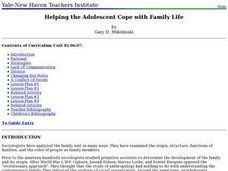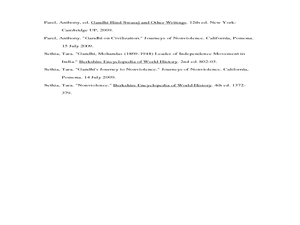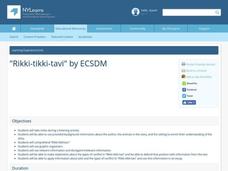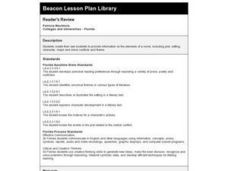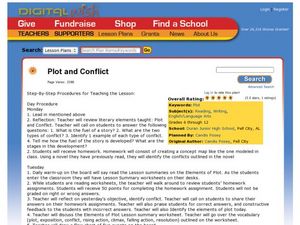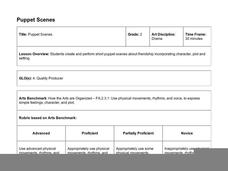Curated OER
Using Literature to Teach Bullying
Students explore signs and types of bullying. In this "building character" lesson, students listen to several read alouds based on a bully theme. Four groups are formed to discuss "gossip", "exclusion", "physical bullying", and "verbal...
Curated OER
Health Grade 5
Fifth graders understand conflict and how to solve them. For this lesson about conflict resolution, 5th graders explore different factors that cause conflict. Students are put into groups and develop a list of examples for a specific...
Curated OER
Helping the Adolescent Cope with Family Life
Students are introduced to the proper ways to deal with conflict at home. In groups, they define family based on what it means to them and identify factors that lead to a breakdown in communications. They participate in role-playing...
Curated OER
Nonviolence and Conflict: Its Importance to Building Community
Students study nonviolence and the values associated with nonviolence. In this social science lesson, students identify the six steps of nonviolence and the six principles of nonviolence as put forth by Martin Luther King, Jr. Students...
Curated OER
Dealing with Conflict
Young scholars identify types of conflict and various responses to anger. In this character education lesson plan, the teacher introduces definitions of conflict and anger responses. Students find examples of types of conflict in...
Curated OER
Conflict
Pupils outline the action in their narrative writing assignments by brainstorming about conflict. In this conflict analysis instructional activity, students define conflict and discuss the different types of conflict. Pupils brainstorm...
Education Oasis
Creative Writing Unit: Analyzing, Interpreting, Discussing and Writing Various Genres of African-American Literature
A six-week unit takes high schoolers through various works of African-American literature, including poems, plays, and short stories. The lesson plan format includes a week-by-week description of activities, goals, materials, and...
Houghton Mifflin Harcourt
El Bronx Remembered
Use a instructional activity to cover different types of conflicts from El Bronx Remembered, a series of short stories by Nicholasa Mohr. The questions address "A Very Special Pet," "Shoes for Hector," "Mr. Mendelsohn," "A Lesson in...
Curated OER
"Rikki-tikki-tavi"
“Rikki-tikki-tavi” provides an opportunity to model for readers how to use background information to enrich understanding of a story. Class members observe animal behavior, listen to biographical background on Rudyard Kipling, study...
Curated OER
Hatchet: Concept Analysis
Take an in-depth look into Gary Paulsen's Hatchet with a concept guide. With a list and explanation of thematic motifs, types of conflicts, and vocabulary in the novel, learners will engage with the text in a whole new way.
Curated OER
Current Events Rubric
Here is a rubric that can be used for your next current event assignment. It details what should be included in each paragraph of the event description and analysis, as well as other requirements for work habits and presentation.
Curated OER
Reader's Review
Learners create booklets to provide information on elements of a novel, including plot, setting, character, major and minor conflicts and theme.
Curated OER
Things Aren't Always What They Seem
Students use video and the Internet to make predictions, draw conclusions, determine conflict and point of view while reading a short story. In this short story analysis lesson, students watch a related video and complete a prediction...
Curated OER
Narrative Writing Outline
Learners explore the elements of a narrative for its purpose, type of audience, mood, main character, minor characters, setting, and conflicts in the story. A story outline is developed and a five paragraph essay composed in this lesson.
Curated OER
Drama from Animal Characters
Learn about animal habitats, characteristics, and writing in a different perspective. The class composes a narrative from the perspective of a fresh water animal, they include a problem and the animal's reaction to the problem. The...
Curated OER
Using Short Stories to Teach Vocabulary and Literary Terms
High schoolers apply vocabulary activities to two short stories in order to increase their comprehension skills. They complete three lessons in which they examine irony, examine how it is used in text, and design an ironic skit. Also,...
Curated OER
Plot and Conflict
Students review the literary elements of plot and conflict. In this plot and conflict lesson, students read a story and answer questions about the plot and conflict within. Students create a concept map for the novel to identify the...
Curated OER
Elements of Fiction
A wide variety of information regarding the elements of fiction is presented in this PowerPoint. Viewers are directed to trace their hand on a blank piece of paper and label each finger with one of the 5 elements of fiction. Additional...
Curated OER
Emulating Shakespeare: To Snooze or Not To Snooze
Students reproduce the pattern of one of Shakespeare's soliloquies, but use their own ideas and words to replace the character's. They replace each word with a word of their own that serves the same purpose.They discuss the speaker in a...
Hawaiʻi State Department of Education
Puppet Scenes
Explore character, plot, and setting through dramatic puppet play. Second graders discuss basic story elements and then practice making a character with their sock puppets. After they've crafted a dynamic puppet, they pair up to create a...
Curated OER
The Nature of the Antagonist
Pupils explain the differences between protagonists and antagonists and recognize the fundamental purpose of an antagonist or villain in storytelling. They also explain conflict as used in literature.
Curated OER
Identifying Conflicts in Stories
Fifth graders practice analyzing story points by discussing Cinderella. In this reading comprehension lesson, 5th graders identify the four main types of conflicts in stories and how they are presented in modern day storytelling ...
Curated OER
Parts of a Story
Students read a short fiction book and demostrate comprehension by identifying the main characters, setting, conflict, theme, and summarizing the main points. They organize the information in Inspiration and create a powerpoint to show...
Mr. Ambrose
The Great Gatsby, F. Scott Fitzgerald
Good discussion questions, quizzes, and tests teach as well as assess. Readers of The Great Gatsby will learn much from the materials in a 36-page packet designed to help students prepare for the AP Literature exam. Included in the...




